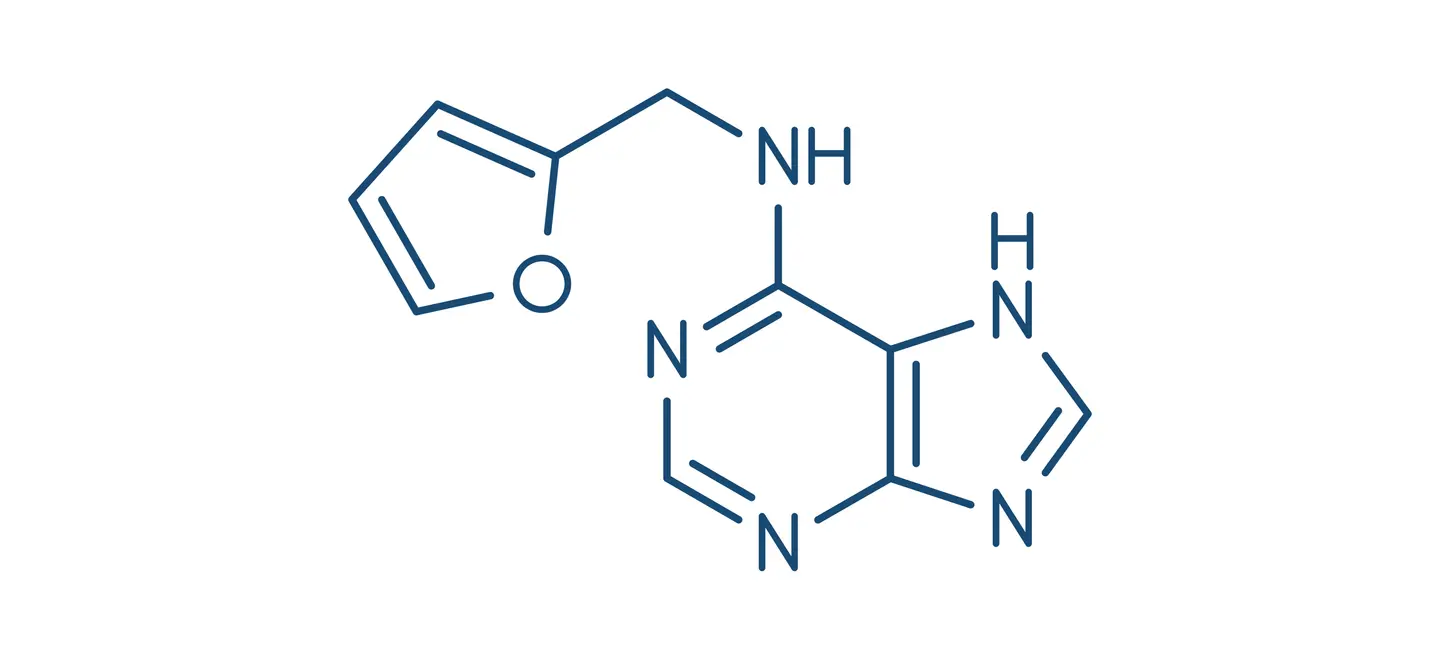
Kinetin is a cytokinin. Cytokinins are compounds that stimulate plants to grow. Kinetin occurs naturally in humans and is sometimes used to make medicine.
People use kinetin most often for aging skin, skin wrinkles from sun damage, and a skin condition that causes redness on the face (rosacea), but there is no good scientific evidence to support these uses.
Is It Effective?
NatMed Pro rates effectiveness based on scientific evidence according to the following scale: Effective, Likely Effective, Possibly Effective, Possibly Ineffective, Likely Ineffective, Ineffective, and Insufficient Evidence to Rate.
- A skin condition that causes redness on the face (rosacea). Early research shows that applying a lotion containing kinetin helps to reduce most symptoms of rosacea, like roughness and redness, in most people. But it doesn't seem to help everyone.
- Skin wrinkles from sun damage. Early research shows that applying a lotion containing kinetin to the face helps to reduce wrinkles and to improve the feeling of the skin in people who have wrinkled skin from the sun.
- Aging skin.
- An inner ear disorder marked by dizziness, hearing loss, and ringing in the ear (Meniere disease).
- Skin imperfections.
- Other conditions.
More evidence is needed to rate the effectiveness of kinetin for these uses.
Is it Safe?
Kinetin prevents green plant leaves from turning brown. There is some information that suggests kinetin might prevent age-related changes in human skin by protecting the DNA in skin cells from damage (antioxidant effects) and decreasing skin water loss.
When taken by mouth: There isn't enough reliable information to know if kinetin is safe. It might cause side effects such as nausea, headache, diarrhea, rash, and ringing in the ears.
When applied to the skin: Kinetin is POSSIBLY SAFE when used in a cream or lotion containing kinetin 0.1% for up to 12 weeks. It might cause side effects such as redness, dryness, peeling, burning, stinging, and itching in some people. But it isn't clear if these symptoms are from kinetin or another ingredient in the products used.
When applied into the ear: There isn't enough reliable information to know if kinetin is safe or what the side effects might be.
Special Precautions & Warnings:
Pregnancy and breast-feeding: There isn't enough reliable information to know if kinetin is safe to use when pregnant or breast-feeding. Stay on the safe side and avoid use.
Bleeding disorders: There is some concern that kinetin might prolong bleeding time and increase the risk of bruising and bleeding in some people with bleeding disorders. If you have a bleeding disorder, use kinetin with caution.
Surgery: Kinetin might increase the risk of bleeding during and after surgery. Stop taking kinetin at least 2 weeks before a scheduled surgery.
Medications that slow blood clotting (Anticoagulant / Antiplatelet drugs)
Interaction Rating=Moderate Be cautious with this combination.
Kinetin might slow blood clotting in some people. Taking kinetin along with medications that also slow clotting might increase the chances of bruising and bleeding in some people.
Some medications that slow blood clotting include aspirin, clopidogrel (Plavix), diclofenac (Voltaren, Cataflam, others), ibuprofen (Advil, Motrin, others), naproxen (Anaprox, Naprosyn, others), dalteparin (Fragmin), enoxaparin (Lovenox), heparin, warfarin (Coumadin), and others.
Herbs and supplements that might slow clotting: Kinetin might slow blood clotting. Using it with other herbs that have the same effect could increase the risk of bleeding in some people. These herbs include angelica, clove, danshen, garlic, ginger, ginkgo, Panax ginseng, red clover, turmeric, and others.
There are no known interactions with foods.
The appropriate dose of kinetin depends on several factors such as the user's age, health, and several other conditions. At this time there is not enough scientific information to determine an appropriate range of doses for kinetin. Keep in mind that natural products are not always necessarily safe and dosages can be important. Be sure to follow relevant directions on product labels and consult your pharmacist or physician or other healthcare professional before using.
6-Furfurylaminopurine, 9-(b-D-Ribofuranosyl)-6-furfurylaminopurine, Cinetina, K, Kinerase, Kinetase, Kinetin Riboside, Kinetina, Kinétine, Kn, N-(2-furanylmethyl)-1H-purin-6-amine, N(6)furfuryladenine, N6-furfuryladenine, Quinetina.
Information on this website is for informational use only and is not intended to replace professional medical advice, diagnosis, or treatment. While evidence-based, it is not guaranteed to be error-free and is not intended to meet any particular user’s needs or requirements or to cover all possible uses, safety concerns, interactions, outcomes, or adverse effects. Always check with your doctor or other medical professional before making healthcare decisions (including taking any medication) and do not delay or disregard seeking medical advice or treatment based on any information displayed on this website.
© TRC Healthcare 2024. All rights reserved. Use and/or distribution is permitted only pursuant to a valid license or other permission from TRC Healthcare.
